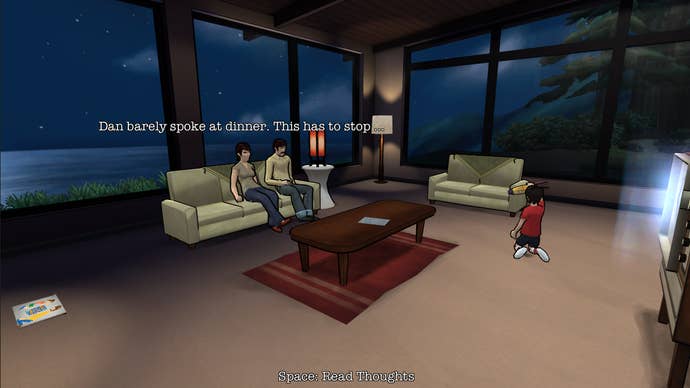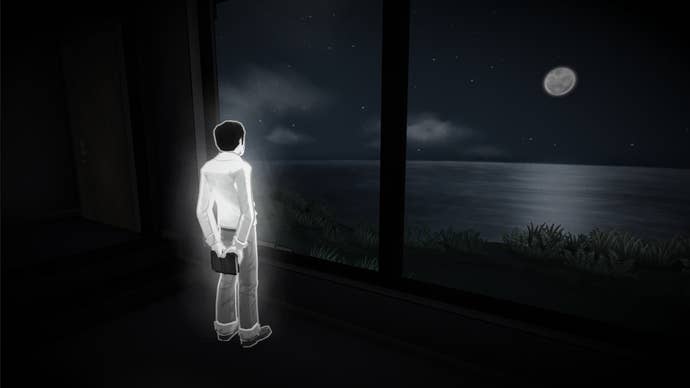Choose Your Own Significance
The Novelist will mean different things to different people; former AAA dev Kent Hudson is hoping it means creative freedom
This article first appeared on USgamer, a partner publication of VG247. Some content, such as this article, has been migrated to VG247 for posterity after USgamer's closure - but it has not been edited or further vetted by the VG247 team.
Kent Hudson wants his first indie game The Novelist to mean something. He just isn't sure what, exactly.
"It lets you tell your own story, and use it as a tool, I hope, to explore the question of whether it's more important to be known for great works or whether it's more important to be good to the people around you," Hudson said. "The through line of the whole thing is that I don't know the answer to that question. It's something I struggle with as much as anyone else, and I have no point of view or perspective on it."
In a more literal sense, The Novelist tells the story of a family of three over the course of a summer. Players play the part of a ghost in the family's summer home, watching them interact over a series of nine chapters, and influencing the father's decisions to prioritize his work, his wife, or his son with his limited time.

"There's no goal, there's no objective to the game," Hudson said. "You just play through, the characters react to your decisions, and in the end, you basically just get to see the scenario you created...There's no editorializing, no judgment on it. You simply choose something and see a reasonable reaction from the characters and things evolve over time."
There's no editorializing, no judgment on it. You simply choose something and see a reasonable reaction from the characters and things evolve over time.
The message players take from his game isn't the only thing Hudson is unsure about when it comes to The Novelist. He's done a handful of playtests with friends and family, and one thing that seems as transparent as the game's playable poltergeist is the decision-making framework underpinning the narrative. While there's not a right or wrong choice about what the father should do with a Sunday afternoon, it's designed to be clear that players are picking between doing what's right by the job, the wife, or the kid. Hudson agrees it's transparent, but he's not certain whether that's ultimately good or bad for the game.
"Obviously, it's really good as a general game design principle that you want players to make informed choices and understand what the reaction is going to be," Hudson said. "That's even just making sure that explosive barrels are colored red and have a warning sign on the side. That level of feedback is important no matter what. But you could probably make the argument on the flip side that life is more complex than these situations being presented and there's a lot more nuance. And maybe I am making it too granular and too upfront. But the game's so geared to this chapter-based, decision-based structure. I'm so deep in it that it's hard for me to even imagine it working a different way. I can't do the mental exercise of comparing it to something else."

Completing the trifecta of uncertainty, Hudson couldn't concretely define his criteria for success with the game.
"There's some component of, 'I'll know it when I see it,'" he explained, adding, "I'm really self-critical, and a lot of what drives me to make things good is I'm my own worst critic. It comes from me being able to look at it and say I think I've done the best I can. I don't have an exact thing I can point to looking for. When it comes out, I'll just see where it lands and figure out from there if it's a bomb or not."
I look back at my last couple years in AAA, and it was so depressing and so difficult.
With a bit more reflection, Hudson pointed to a few factors he would weigh heavily: the appraisals of respected peers, Metacritic scores that weren't dreadfully low ("Where there's smoke, there's fire," he explained), and finally, an element of financial success.
"I would like this game to make enough money to fund the next one," he said. "I would like to sustain being indie, because it's different and challenging in a lot of ways, but it's great."
And here we hit one thing upon which Hudson is most adamantly certain: That leaving the AAA industry behind was a good move. Though his work on games like BioShock 2 and Deus Ex: Invisible War was experienced enjoyed by plenty of gamers, the appeal of AAA development had soured for Hudson.
"I look back at my last couple years in AAA, and it was so depressing and so difficult," Hudson recalled. "I was just unhappy for a lot of that time. And not just unhappy with work; it was bleeding over into my life. So this has been stressful in a lot of ways, but the ability to make exactly what you want and have your destiny in your hands..."
If The Novelist fails, at least Hudson will know who's responsible.
"And that's actually really sickly reassuring," he said. "When you're part of a large organization, you can do great work and have it torpedoed by stuff completely out of your control. Any time an organization is that big, there's a chance that good people will get thrown under the bus or have their work stomped by stuff out of their control. It's actually pretty refreshing that if this game bombs, I'll at least know that I screwed it up."
Hudson said going indie was never part of any grand plan, that he was pushed to it more from a succession of frustrating jobs.
That's such a gross situation in general, people getting their name on the box or getting all the press for something 150 people worked three years on.
"I just realized it had been years since I felt like I was making forward progress on stuff that I cared about and really believed in," Hudson said. "I started realizing for the first time that your career is a finite resource. You've only got so many years, and I just didn't want to keep waking up and saying, 'Oh, there went another two years. Another year, whatever.' I was just going crazy because I wasn't working on anything I believed in. And when I did have a chance to work on cool stuff, other corporate reasons meant it wasn't going to have a chance to go anywhere. So I looked at my options and thought how I could get to a place where I'm working on something I love, believe in, and feel passionate about every day? It was a lot more of an emotional decision than an intellectual one."
It's a decision Hudson seems comfortable with now, although he admits his first attempted indie game, a tablet project intended to help him learn Unity, suffered from many of the same problems he'd experienced in AAA games. He scrapped it, started from scratch on the game that became The Novelist, and hasn't looked back. Even if he had the option of being the auteur shaping the vision behind a AAA title, Hudson showed no interest in the idea.
"That's such a gross situation in general, people getting their name on the box or getting all the press for something 150 people worked three years on," Hudson said. "I've got friends who have been put up front like that who didn't want it. There's a certain reality to how you have to market things, so I'm not saying by default that if you're a figurehead for a game, you're a jerk. There are certainly jerks who do that. But [being indie] is preferable to that because there's a simplicity to it. It's like, 'I worked a couple years really hard. I made this thing. I hope you like it.'"
[CORRECTION] Originally, this article incorrectly said Hudson was unsure about the game launching this summer. While he still hasn't nailed down a release date, Hudson said he is still planning on a summer launch, adding the season ends September 22.

